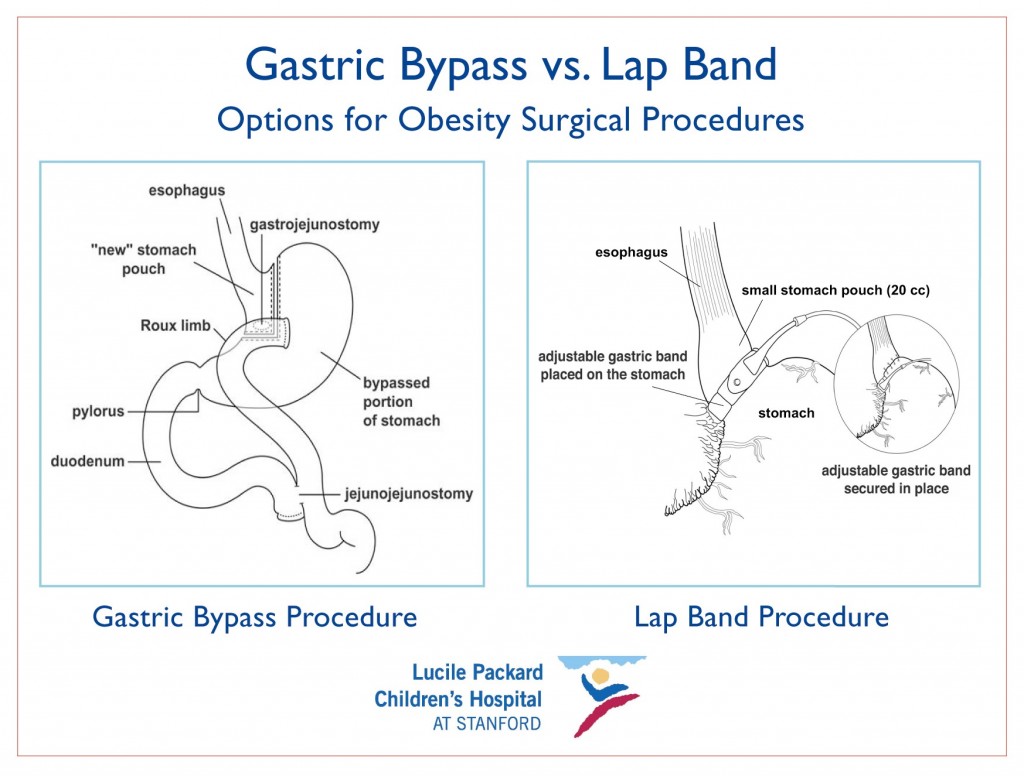Can you imagine having surgery which permanently shrinks your stomach while at the same time makes alterations to the GI tract in order to bypasse an integral length of your intestine — the duodenum. Wow! How did we ever get to this point in the weight loss industry?!
Also known as Bariatric surgery, Gastric bypass surgery (GBS) is prescribed to treat not only morbid obesity, but also Type 2 diabetes, hypertension, sleep apnea, and other so-called co-morbid conditions.
Did you get that? The same operation used to treat serious cases of morbid obesity is now used to treat sleep apnea, hypertension and diabetes. Perhaps you now see how the surgical profession likes to take over any area of health where they can run a LOT of patients through their ambulatory surgery centers.
As you can see, we are not at all happy with this trend as health coaches. It represents the epitome of treating disease with a scalpel when these conditions ought to be managed with a holistic approach, natural therapies and integrative medicine. When you rearrange a vital organ like the stomach and forever alter the intestinal tract, the body is moved past a point of no return, often with serious consequences.
As is usually the case, most people who opt for bariatric surgery have no clue what they are really setting themselves up for. The surgeons, who have very little business in the weight loss industry, go to great lengths to practice non-disclosure about the unintended consequences of such an invasive and disfiguring operation.
Here’s a little revelation from Livestrong.com:
Some Surgeons are Doing it for Money
“Gastric bypass surgery is an expensive procedure, and many people opt to pay for it out of pocket when their insurance does not cover the procedure. In some hospitals, surgeons will provide the surgery and discharge the patient without adequate screening or education prior to surgery. This can bring a lot of money in to the surgeon and the hospital; however, it can leave the patient without a complete understanding of what is required to stay healthy. Good gastric bypass surgeons will have a multidisciplinary team including a psychotherapist, registered dietitian, exercise specialist and nurse who is involved in screening and education both before and after the surgery.”
There are numerous potential risks and complications of gastric bypass surgery which ought to be pointed out to every ‘candidate’ for this procedure. Some of the following medical complications are quite serious, others may seem to be not so grave; nevertheless, all of them should be carefully considered when both patient and doctor discuss such a RADICAL approach to weight loss.
Potential concerns and risks of gastric bypass
• A condition known as dumping syndrome can occur from eating high-fat, high-sugar foods. The results can be unpleasant and may include vomiting, nausea, weakness, sweating, faintness, and diarrhea. Some patients actually view this as a positive mechanism that prevents them from reverting back to unhealthy eating habits.
• Patients must supplement their diet with a daily multivitamin and calcium. Some patients must take vitamin B12 and/or iron.
• The stomach, duodenum, and parts of the small intestine cannot be seen easily using X-ray or endoscopy if there are problems after surgery such as ulcers, bleeding, or malignancy.
• Dehiscence (separation of tissue that was stitched or stapled together)
• Leaks from staple lines
• Ulcers
• Increased gas[1]
Likewise, there are some very serious risks associated with bariatric surgery as follows:
Bariatric surgery risks
• Abdominal hernia
• Chest pain
• Collapsed lung
• Constipation or diarrhea
• Dehydration
• Enlarged heart
• Gallstones, pain from passing a gallstone, inflammation of the gallbladder, or surgery to remove the gallbladder
• Gastrointestinal inflammation or swelling
• Stoma obstruction
• Stretching of the stomach
• Surgical procedure repeated
• Vomiting and nausea [1]
Lastly, we are compelled to share the well-known medical risks and dangers which can occur during and after any surgery that is performed within or near the greater abdominal area.
Risks associated with abdominal surgery
• Bleeding
• Complications due to anesthesia and medications
• Death
• Deep vein thrombosis
• Injury to stomach, esophagus, or surrounding organs
• Infection
• Pain
• Pneumonia
• Pulmonary embolism
• Shoulder pain
• Stroke or heart attack[1]
The stomach is permanently changed as is part of the intestinal tract
Why would anyone want to alter their physiology – forever – to address a physical problem that clearly has its roots in issues that can be dealt with quite effectively in other safe, practical and enduring ways?
Here is how the stomach and intestinal areas are impacted by this deforming procedure. What follows is a diagram of the most common re-arrangement of the GI tract after the surgical techniques known as Roux-en-Y is employed.
Here’s another comparative perspective which highlights the true changes that are made.
Here is one more comparative diagram of two different procedures for additional perspective.
Is this what the physicians are showing their surgical candidates?
Here’s another alternative procedure to the most common surgical technique, known as Roux-en-Y.
Pictures do speak a thousand words, don’t they? You can literally see just how much of the stomach is bypassed with this operation, as well as the duodenum. Both are practically taken out of the mix as far as digestion is concerned. What then occurs when all the necessary digestive processes in both the stomach and duodenum are completely avoided.
Do not HCL and other gastric secretions serve an important function in the proper digestion of our food and beverage?
Does the duodenum not have purpose beyond just being a mechanical conduit?
These, and many other common sense questions, ought to be posed to every surgeon who attempts to sell this extraordinarily misguided surgery. In the absence of full disclosure about the inherent dangers of this surgical procedure, a candidate is placed at great risk post operatively. They also become vulnerable to a whole host of other serious health problems down the road. As an example, the following article, which recently appeared in the mainstream media, points out yet another risk asociated with this ill-advised surgical procedure.
Weight-Loss Surgery Increases Risk of Alcohol Addiction
Conclusion:
If obesity or diabetes or sleep apnea or hypertension is the health challenge of the day, why not first try to explore those alternatives which address the true causes. Invasive procedures should only be considered as a very last resort, if even then based on the true cost/benefit ratio.
Typically, there are almost always unintended consequences, collateral damage and toxic side effects associated with medical approaches that involve unnecessary surgery, drug therapies, and radiation. It’s very easy to research the drawbacks on the internet by way of support groups and alternative health websites.
Why not engage those health professionals who can steer you in a more wholesome and sound direction. You just may save a lot of time and money, as well as avoid much unnecessary pain and suffering, by pursuing the path of holistic health.
May you enjoy great health,
The Health Coach
Endnotes:
[1] “Risks and Complications – Gastric Bypass Surgery” @ www.realize.com
Health Disclaimer:
All content found at The Health Coach is for information purposes only. Therefore, the information on this website is not a substitute for professional medical care and should not be construed as either medical diagnosis or treatment. All information contained herein ought to be considered within the context of an individual’s overall health status and prescribed treatment plan.
Since The Health Coach does not diagnose, treat, mitigate, cure, or heal any type of disease or medical condition, the information contained at this website is not intended to provide specific physical, mental, emotional or psychological health advice.
It is entirely the reader’s decision to act or not act on any information at The Health Coach. Therefore, we fully invoke the HOLD HARMLESS clause for those who are responsible for putting any of this information into practical use and application.
© 2012 The Health Coach
Permission is granted to post this health blog as long as it is linked back to the following url: https://thehealthcoach1.com/?p=2627




